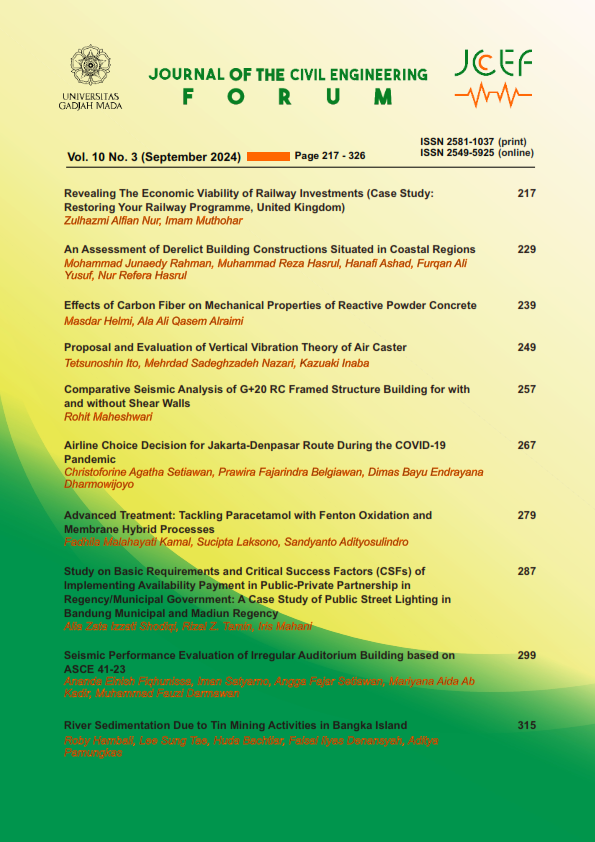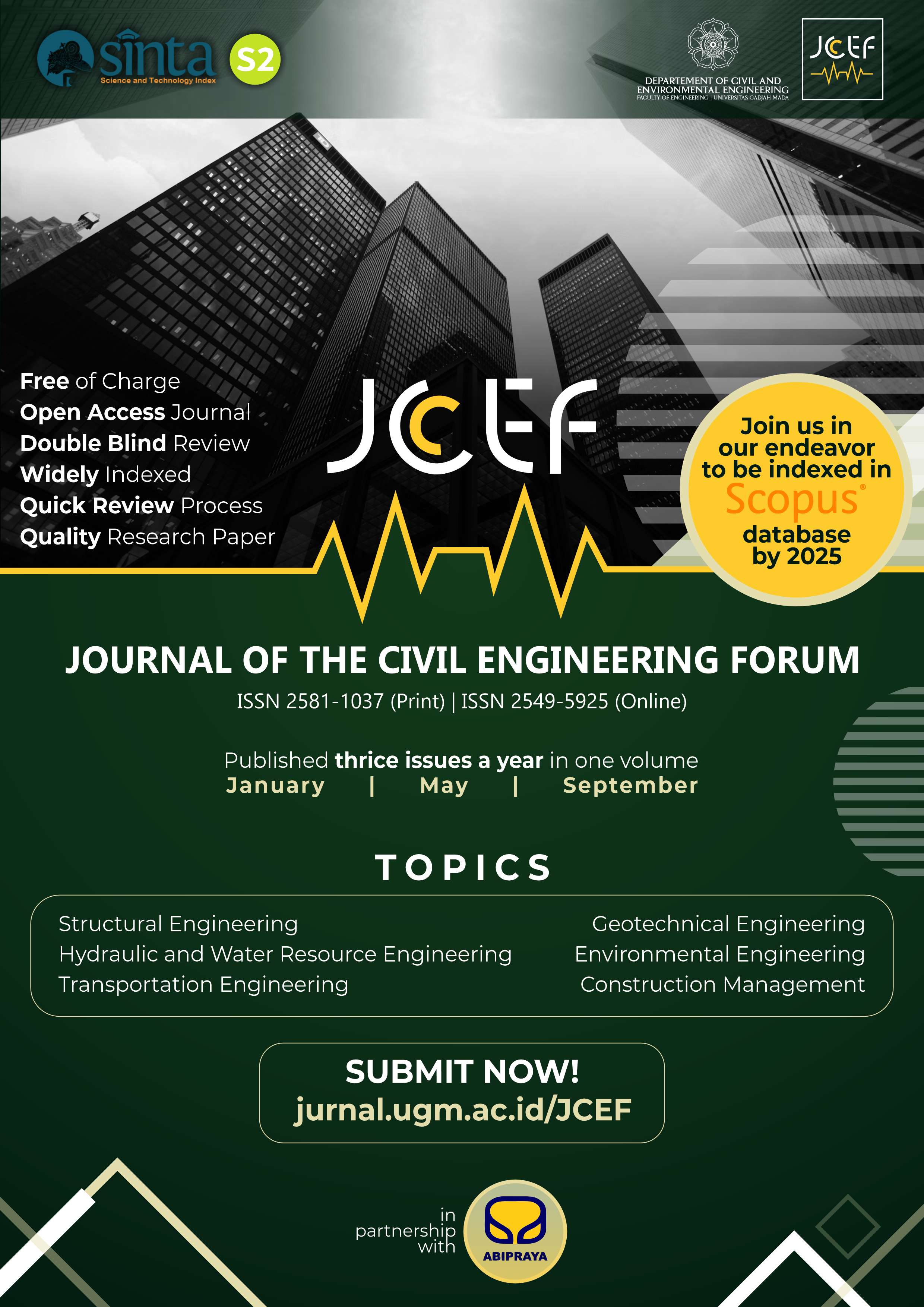River Sedimentation Due to Tin Mining Activities in Bangka Island
Abstract
Sedimentation in rivers is a major issue of environmental damage in the Kepulauan Bangka Belitung Province. In the last two decades, since tin mining was carried out by the community, massive sedimentation has occurred in the river. The purpose of the study is to investigate the characteristics of sediment materials and the effects of illegal tin mining on river sedimentation on Bangka Island. Sediment characteristics can be seen from the distribution of grain size and specific gravity of the bed sediment material and the concentration of suspended sediments seen from their position along the river. Sediment grain size is classified according to the American Geophysical Union. A total of 45 sediment samples spread across 12 rivers in the district capital area on Bangka Island were collected at the end of the rainy season in 2023, and 4 more samples were added in the dry season of 2023 in the Muntok River. The MPM formula was applied to estimate bedload transport and statistical methods were used to estimate suspended sediment rates. Additionally, the sedimentation rates are estimated based on dependable continuous flow with a probability exceeding 50% (Q50%). The study’s findings indicate that Illegal tin mining in Bangka Island has a major impact on river sedimentation. The particle size distribution of bed material sediments does not align with what is typically found in nature, which often exhibits coarser particles upstream and finer downstream. Similarly, in areas downstream of tin mining operations, the concentration of suspended particles increases significantly, up to 12 times higher than natural conditions.
References
Asdak, C. (2004), Hidrologi dan Pengelolahan Daerah Aliran Sungai, Gadjah Mada University Press,Yogyakarta.
Bangka Belitung River Basin Development Agency (2023), ‘Master plan report: Engineering service for bangka island flood management in bangka belitung province’. Pangkalpinang.
Besperi (2011), ‘Pengaruh hutan bakau terhadap sedimentasi’, Inersia (Jurnal Teknik Sipil) 3(1), 33–38. URL: https://doi.org/10.33369/ijts.3.1.33-38
Camenen, B. and Larson, M. (2005), ‘A general formula for non-cohesive bed load sediment transport’, Estuarine, Coastal and Shelf Science 63(1–2), 249–260. URL: https://doi.org/10.1016/j.ecss.2004.10.019
Fuladipanah, M. and MakVandi, A. (2013), ‘Application of the usbr equation for surveying balance of sediment yield in dez river branches in iran’, Environment Protection Engineering 39(3), 185–195. URL: https://doi.org/10.5277/epe130313
Ghani, N., Othman, N. and Baharudin, M. (2013), Study on characteristics of sediment and sedimentation rate at sungai lembing, kuantan, pahang, in ‘Malaysian Technical Universities Conference on Engineering & Technology (MUCET) 2012’, Kangar Perlis.
Hambali, R. and Apriyanti, Y. (2016), ‘Studi karakteristik sedimen dan laju sedimentasi sungai daeng kabupaten bangka barat’, Fropil 4(2), 165–174. URL: https://doi.org/10.33019/fropil.v4i2.1248
Hambali, R. and Wahyuni, S. (2021), The potential for land erosion due to primary tin mining in bangka island, in ‘3rd International Conference on Green Energy and Environment (ICoGEE)’, Pangkalpinang.
Hamid, I., Jaya Priatna, S. and Hermawan, A. (2017), ‘Karakteristik beberapa sifat fisika dan kimia tanahpada lahan bekas tambang timah’, Jurnal Penelitian Sains 19(1), 23–31. URL: https://doi.org/10.36706/jps.v19i1.8
Hurni, H. (1999), ‘Sustainable management of natural resources in african and asian mountains’, Ambio 28(5), 382–389.
Ikhsan, J., Wardhana, C. and Widiyarto, D. (2019), Sediment characteristics of bed load transport in down stream of progo river, indonesia, in ‘First International Conference of Construction, Infrastructure, and Materials’, Jakarta.
Junaidi (2012), ‘Kajian angkutan sedimen dasar pendekatan laju angkutan sediment akber dimensi einstein (1950)’, Wahana Teknik Sipil 17(1), 11–20. URL: https://doi.org/10.32497/wahanats.v17i1.110
Kondolf, G., Gao, Y., Annandale, G., Morris, G., Jiang, E., Zhang, J., Cao, Y., Carling, P., Fu, K., Guo, Q., Hotchkiss, R., Peteuil, C., Sumi, T., Wang, H., Wang, Z., Wei, Z., Wu, B., Wu, C. and Yang, C. (2014), ‘Sustainable sediment management in reservoir sand regulated rivers: Experiences from five continents’, Earth’s Future 2(5), 256–280. URL: https://doi.org/10.1002/2013ef000184
Makenanizadeh, H. (2012), ‘Using usbr and fao methods for sediment loads estimating in karkheh hydro electrical dam’, International Journal of Structronics & Mechatronics pp. 1–7.
Meyer-Peter, E. and Muller, R. (1948), Formulas for bed-load transport, in ‘Report on the 2nd Meeting International Association Hydraulic Structure Research’, Stockholm, Sweden.
Mock, F. (1973), Land Capability Appraisal Indonesia: Water Availability Appraisal, Bogor, Indonesia.
Nurtjahya, E., Franklin, J., Umroh and Agustina, F. (2017), The impact of tin mining in bangka belitung and its reclamation studies, in ‘Sriwijaya International Conference on Engineering, Science and Technology (SICEST 2016)’, Bangka Island.
Nyssen,J., Poesen, J., Moeyersons, J., Deckers, J., Haile, M. and Lang, A. (2004), ‘Human impact on the environment in the ethiopian and eritrean highlands-a state of the art’, Earth-Science Reviews 64(3–4), 273–320. URL: https://doi.org/10.1016/S0012-8252(03)00078-3
Pirwanda, F. and Pirngadie, B. (2015), ‘Dampak kegiatan tambang timah inkonvensional terhadap perubahan guna lahan di kabupaten belitung’, Jurnal Planologi Unpas 2(3), 177–194.
Purnomo, S., Widiyanto, W., Pratiwi, T. and Moe, I. (2015), ‘Analisis sedimentasi di pelabuhan pendaratan ikan (ppi) logending’, Dinamika Rekayasa 11(1), 29–37. URL: https://doi.org/10.20884/1.dr.2015.11.1.93
Sadeghian, M., Heydari, M., Noori, M., Ebrahimi, F. and Shahiri Parsa, A. (2014), ‘Evaluating the suspended sediment of mahabad dam using statistical methods’, Journal of river engineering 2(7).
Sembiring, A., Mananoma, T., Halim, F. and Wuisan, E. (2014),‘Analisis sedimentasi di muara sungai panasen’, Jurnal Sipil Statik 2(3), 148–154.
Sukarman, Gani, R. and Asmarhansyah (2020), ‘Tin mining process and its effects on soils in bangka belitung islands province, indonesia’, Sains Tanah-Journal of Soil Science and Agroclimatology 17(2), 180–189. URL: https://doi.org/10.20961/stjssa.v17i2.37606
Sutono, S., Haryati, U. and Agus, F. (2020), ‘Karakteristik tanah dan strategi rehabilitasi lahan bekas tambang timah di provinsi kepulauan bangka belitung’, Jurnal Sumberdaya Lahan 12(2), 99–116. URL: https://doi.org/10.21082/jsdl.v12n2.2018.99-116
Ulya, I., Amilda and Otoman (2024), ‘Timah dalam pembentukkan budaya dan ekonomi masyarakat bangka’, Tanjak: Jurnal Sejarah dan Peradaban Islam 4(1), 68–79. URL: https://doi.org/10.19109/xcks2817
Unde, M. and Dhakal, S. (2009), ‘Sediment characteristics at river confluences: A case study of the mulakas confluence, maharashtra, india’, Progress in Physical Geography 33(2), 208–223. URL: https://doi.org/10.1177/0309133309338655
Van der Weert, R. (1994), Kondisi Hidrologi Indonesia, WL|Delft Hydraulics.
Williams, M. (2012), ‘River sediments’, Philosophical Transactions of the Royal Society A: Mathematical, Physical and Engineering Sciences 370(1966), 2093–2122. URL: https://doi.org/10.1098/rsta.2011.0504
Copyright (c) 2024 The Author(s)

This work is licensed under a Creative Commons Attribution-ShareAlike 4.0 International License.
Copyright is granted to authors for the purpose of providing protection for articles written to describe experiments and their results. JCEF will protect and defend the work and reputation of the author and are also willing to address any allegations of violation, plagiarism, fraud, etc. against articles written and published by JCEF. JCEF is published under the terms of the Creative Commons Attribution-ShareAlike 4.0 International License (CC BY-SA 4.0). The author holds the copyright and assigns the journal rights to the first publication (online and print) of the work simultaneously.




